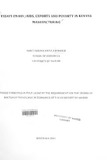| dc.description.abstract | Empirical investigations exploring the nexus between poverty, exports, health and labour productivity in manufacturing sectors of developing countries are rare. Existing analysis has mainly centered on performance of firms with very limited analysis on the connection between health, exporting and the well-being of workers. It is in this context that the current thesis was undertaken to examine the linkages between employees' HIV/AIDS concerns (proxy for mental health), export competitiveness and the poverty status of the labour force in Kenyan manufacturing industry.
The study empirically examines productivity and welfare effects of mental health capital, a complement to human capital. The thesis consists of three linked essays. The first essay evaluates the effects of mental health on firm revenues and wages of workers. The second essay establishes the link between mental health and total factor productivity and the consequent effects of productivity on exports. Mental health is assumed to affect total factor productivity through training of workers. The third essay analyses the impact of exports on the poverty status of the workers. The importance of improved mental health in exporting lies in the role mental health plays in the trainability and productivity of manufacturing workers. We assume that if output is produced efficiently, a firm is more likely to engage in exporting since production efficiency makes it competitive in international trade. Exporting firms in tum, are more likely to pay their workers higher wages and hence lift them out of poverty.
Using the cross-sectional data for 2002/3 from Kenyan manufacturing firms, the thesis demonstrates that firm expenditures on medical care improve the mental health of workers, which in tum results in increased productivity of the labour employed by manufacturing firms. Heckman selection models and the control function estimation techniques are used to address heterogeneity and sample selectivity problems encountered in the models of impact analyses in situations such as the ones studied in the thesis. Importantly, the thesis demonstrates that total factor productivity matters for export propensity and export intensity, and that exporting is a viable strategy for poverty reduction. | en_US |

